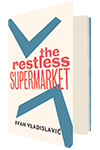Aubrey Tearle is a proofreader by profession but also in spirit. His life’s great love is orderliness, his passion predictability; a psychiatrist might diagnose him as obsessive-compulsive or maybe something on the autism spectrum, but the descriptor his acquaintances most often use is dry. He firmly believes that “routine is the foundation of happiness,” so he structures the days of his retirement as rigidly as those of a workweek, embarking on a quest—his sword a sharpened pencil, his shield the Pocket Oxford—to hunt down and correct all the errors in his hometown. These range from typos in newspapers, phone books, advertisements, and menus to inaccurately named businesses, like the eponymous twenty-four-hour Restless Supermarket: “‘Restless doesn’t mean that you never rest,” he explains to the uncomprehending store manager. “It means, and I quote, never still, fidgety.”
It would be a cute story if set in, say, New York, where you could sell film rights and call it As Good as It Gets 2. But Tearle lives in Johannesburg and it is 1993, the tumultuous year before Nelson Mandela was elected, and the daily news he proofreads is full of terrorist attacks, civilian deaths, political skirmishes, and abuse allegations: a riot of disorder against the crumbling wall of apartheid.
We can assume that Tearle, well into his retirement in the 1990s, grew up in the heyday of apartheid, and that he had a similar upbringing to that of his creator. Ivan Vladislavić was born in 1957 in Pretoria, not far from Johannesburg, and was weaned on white nationalist history: twisted truths and flat-out lies—that South Africa was entirely empty when white settlers arrived, for example—that justified an elaborate system of segregation. Identity and geography were both decided by the government: all adults were given identity cards specifying the race they’d been designated; communities of thousands were picked up and plopped elsewhere, behind fresh borders declaring new countries, making black South Africans into immigrants overnight. There were many dissenters, including grown-up Vladislavić, but ending oppression required a new system to replace it, and apartheid was so rigidly impressed upon South Africa that there was bound to be chaos between dismantling the old and crafting the new.
Tearle lives in the thick of this chaos. His surroundings push against his rigid nature, producing a narrator who is sometimes cruel and racist, other times comic and vulnerable. Too much is changing; he feels “stuffed with change, like a piggy bank or a parking meter.” He channels his fear of disorder in the streets—a violated supermarket mascot, a speeding van, a dead body spied from his window—into hyperawareness of order on the page, lending a sense of urgency to his proofreading mission. “There is nothing I admire more than a system,” he declares primly. It’s an understatement: he needs a system, and apartheid was a very elaborate one, as thick with rules and regulations as language is—which helps explain Tearle’s problematic longing for it.
The quest to proofread Johannesburg, which has allowed Tearle to avoid acknowledging the revolution around him for nearly a decade, is given shape and a title midway through The Restless Supermarket: Tearle’s story-within-a-story, titled “The Proofreader’s Derby,” follows intrepid proofreader Aubrey Fluxman through a ravaged country where objects move and morph of their own accord, body parts mix themselves up, and the geography shifts uncontrollably. Here, though, all problems can be fixed by the simple magic of editing. Redraw a map and geography changes; remove names from the phone book and people simply disappear. Here the proofreader is all-powerful; hero, king, god, even martyr if he chooses. “As for the crosses left off the t’s, who do you suppose shall bear them?”
Erasure is the most dangerous weapon in Fluxman’s arsenal, yet he finds more and more cause to use it, veering into editorial ethnic cleansing. The ending of Tearle’s fiction is chilling: only Fluxman remains, sweeping the streets for any remaining errors and, alone in a world almost entirely of his own making, dumping them into the sea. Here we sense that Tearle, through the process of writing, has finally glimpsed how easily a desire for order above all else can slip into fascism, and how lonely perfection might really be. Just as it’s time to share “The Proofreader’s Derby” with the few people he really cares about, Tearle has to face real loss: of friends, love, and a sense of home—all the flawed, imperfect things that make up a life. With his proofreader’s pencil and Pocket Oxford, he has no choice but to join in the fray, an all-too-human Fluxman in a world he can’t erase.
—Mary Mann





